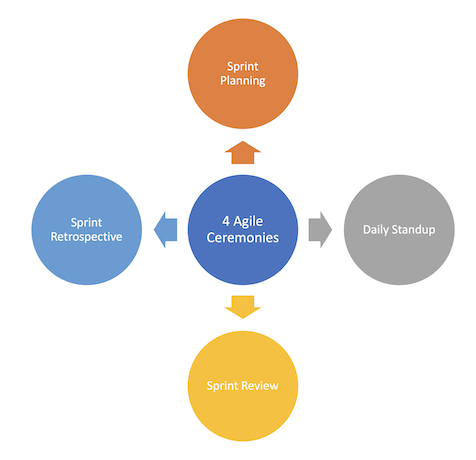1. Sprint Planning
Sprint Planning initiates the Sprint by laying out the work to be performed for the Sprint. This resulting plan is created by the collaborative work of the entire Scrum Team in the project.
The Product Owner ensures that attendees are prepared to discuss the most important Product Backlog items and how they map to the Product Goal. The Scrum Team may also invite other people to attend Sprint Planning to provide advice.
Sprint Planning addresses the following topics:
Topic One: Why is this Sprint valuable?
The Product Owner proposes how the product could increase its value and utility in the current Sprint. The whole Scrum Team then collaborates to define a Sprint Goal that communicates why the Sprint is valuable to stakeholders. The Sprint Goal must be finalized prior to the end of Sprint Planning.
Topic Two: What can be Done this Sprint?
Through discussion with the Product Owner, the Developers select items from the Product Backlog to include in the current Sprint. The Scrum Team may refine these items during this process, which increases understanding and confidence.
Selecting how much can be completed within a Sprint may be challenging. However, the more the Developers know about their past performance, their upcoming capacity, and their Definition of Done, the more confident they will be in their Sprint forecasts.
Topic Three: How will the chosen work get done?
For each selected Product Backlog item, the Developers plan the work necessary to create an Increment that meets the Definition of Done. This is often done by decomposing Product Backlog items into smaller work items of one day or less. How this is done is at the sole discretion of the Developers. No one else tells them how to turn Product Backlog items into Increments of value.
The Sprint Goal, the Product Backlog items selected for the Sprint, plus the plan for delivering them are together referred to as the Sprint Backlog.
Sprint Planning is timeboxed to a maximum of eight hours for a one-month Sprint. For shorter Sprints, the event is usually shorter.
2. Daily Scrum
The purpose of the Daily Scrum is to inspect progress toward the Sprint Goal and adapt the Sprint Backlog as necessary, adjusting the upcoming planned work in a project.
The Daily Scrum is a 15-minute event for the Developers of the Scrum Team. To reduce complexity, it is held at the same time and place every working day of the Sprint. If the Product Owner or Scrum Master are actively working on items in the Sprint Backlog, they participate as Developers.
The Developers can select whatever structure and techniques they want, as long as their Daily Scrum focuses on progress toward the Sprint Goal and produces an actionable plan for the next day of work. This creates focus and improves self-management of the project team members.
Daily Scrums improve communications, identify impediments, promote quick decision-making, and consequently eliminate the need for other meetings.
The Daily Scrum is not the only time Developers are allowed to adjust their plan. They often meet throughout the day for more detailed discussions about adapting or re-planning the rest of the Sprint’s work.
Want a deep understanding of Agile/Scrum methodology? IMT-PM provides 30 PDUs Bundle, which includes Agile for Practitioners (get knowledge and confidence in the Agile framework) and Scrum for Practitioners (understand the roles in the Scrum Project Management and how to do the Scrum best in the current situation of the project).
30 PDUs Bundle also helps PMI-ACP® certification holder renew your PMI-ACP® certification immediately at the most affordable price. No extra charge. No test. No exam. Certificate available. We have everything you need in one package. Register now to receive an 80% discount.
Source: https://scrumguides.org/
IMT-PM - PMI Authorized Training Partner (Premier tier) offers various courses for PMP®/PgMP®/PfMP®/PMI-PBA®/PMI-ACP®/PMI-RMP®/PMI-SP® Renewal.
Our best sellers are:
- 60 PDU Bundle: https://online.imt-pm.com/course/60-pdus-bundle-70
- 50 PDU Bundle: https://online.imt-pm.com/course/50-pdus-bundle-75
- 40 PDU Bundle: https://online.imt-pm.com/course/40-pdus-bundle-87
- 30 PDU to renew PMI-ACP®: https://online.imt-pm.com/course/30-pdus-to-renew-pmi-acp®-88
- 15 PDUs to Renew CAPM®: https://online.imt-pm.com/course/15-pdus-to-renew-capm®-108
